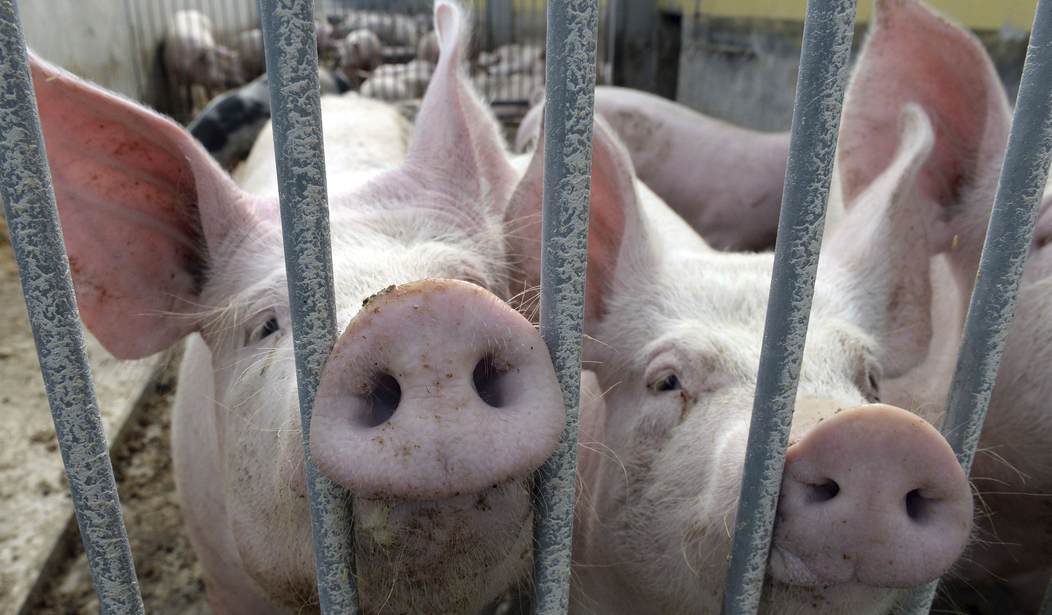In a 5-to-4 ruling, the Supreme Court upheld California’s Proposition 12 last week, requiring pork sold in the state to meet a number of animal welfare requirements.
Prop 12, a 2018 ballot measure approved by more than 62 percent of California voters, bans sale of pork in the state from anywhere in the country that confines pregnant pigs to tight “gestation crates.” The measure also has freedom of movement standards for veal calves and hens.
Justices Neil Gorsuch, Clarence Thomas, Sonia Sotomayor, Elena Kagan, and Amy Coney Barrett ruled the case was properly dismissed by lower courts—a decision that goes against the U.S. pork industry that has spent years fighting the measure.
For the pork industry, the Supreme Court decision is a significant loss. Agriculture groups said that if the California law was upheld, it would not be long before other states adopted separate requirements making it difficult for producers to meet a maze of requirements.
The U.S. Court of Appeals for the Ninth Circuit previously upheld Proposition 12 and dismissed a lawsuit filed by agriculture interests against the law, on the grounds the industry groups did not state a claim of damages.
The pork producers brought the appeal to the Supreme Court claiming Proposition 12 violates the Interstate Commerce Clause of the U.S. Constitution. The Solicitor General of the United States, Elizabeth B. Prelogar, came down on the side of the Interstate Commerce Clause and the pork producers. (Food Safety News)
In the majority opinion, Gorsuch wrote: “What goods belong in our stores? Usually, consumer demand and local laws supply some of the answers. Recently, California adopted just such a law banning the in-state sale of certain pork products derived from breeding pigs confined in stalls so small they cannot lie down, stand up, or turn around. In response, two groups of out-of-state pork producers filed this lawsuit, arguing that the law unconstitutionally interferes with their preferred way of doing business in violation of this court’s dormant Commerce Clause precedents. The district court and court of appeals dismissed the producers’ complaint for failing to state a claim.
Recommended
"We affirm. Companies that choose to sell products in various states must normally comply with the laws of those various states. Assuredly, under this court's dormant Commerce Clause decisions, no state may use its laws to discriminate purposefully against out-of-state economic interests. But the pork producers do not suggest that California's law offends this principle. Instead, they invite us to fashion two new and more aggressive constitutional restrictions on the ability of states to regulate goods sold within their borders. We decline that invitation. While the constitution addresses many weighty issues, the type of pork chops California merchants may sell is not on that list."
Republican lawmakers expressed their disappointment with the ruling.
"I certainly respect the authority of the individual States and I appreciate the Supreme Court's instinct to exercise caution when adjudicating conflicting state interests," House Agriculture Committee Chairman Glenn "GT" Thompson (R-PA) said in a statement. "That said, I am disappointed in today's decision on California's Proposition 12. U.S. producers simply cannot operate in a system where one state can dictate production standards for the entire country. I will continue to review today's decision and explore solutions that ensure the hardworking farmers and ranchers who put the food on the tables of the American people can do so without being unduly burdened by excessive regulation."
Disappointing news the Supreme Court upheld 9th circuit decision to allow California to regulate how pork reaches ur plate Prop 12 is an attack on your breakfast U can expect to pay more for bacon California’s liberal regulations impact pork producers nationwide
— Chuck Grassley (@ChuckGrassley) May 11, 2023
Extremists in liberal states like California shouldn’t be allowed to BAN OUR BACON and punish hardworking Iowa pork producers with overreaching policies. Disappointed in SCOTUS decision on Prop 12. I’ll keep fighting for #Iowa farmers!
— Joni Ernst (@SenJoniErnst) May 11, 2023
























Join the conversation as a VIP Member